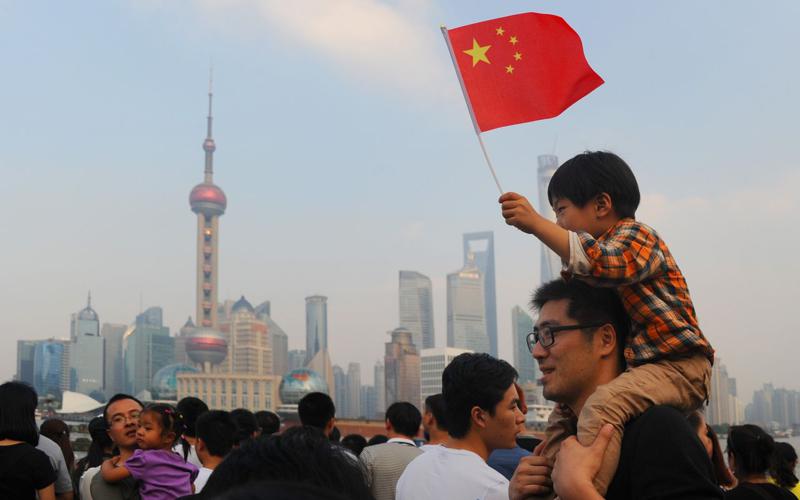It may look like a shadow play at a distance. On May 21, the American Trump administration issued its first “policy paper” outlining a comprehensive approach to China, calling for a coordinated international strategy in defense of the shared value system threatened by Beijing. The following day, Beijing ignored the paper and gave small attention to the US, calling at the plenary session of its annual parliament for a return to the origins of its development, the countryside.
Here, in the rural areas, the long process of reform and opening up began. Four decades ago over 90% of Chinese were employed in agriculture, but today rural China is home to less than 40% of the population, some half a billion people.[1]
In his presentation of the government’s work report, Premier Li Keqiang[2] asked to «increase the area for high quality farmland, recover the [recently lowered] production of hogs, the rice bag, and the vegetable basket… We will fully implement the system of provincial governors assuming responsibility for the “rice bag” and city mayors for the “vegetable basket”.… It is imperative, and it is well within our ability, to ensure the food supply for 1.4 billion Chinese people through our own efforts».
China at long last got cold feet about the swine fever ravaging the countryside and killing over half of all China’s pig population – that is, eliminating 1/4 of all the pork in the world. Moreover, with the new chill in the international political atmosphere, Beijing is apparently beginning to worry about its food production, heavily dependent on imports. Therefore, it reacts by trying to ensure its domestic food supply. Beijing doesn’t trust the international market any longer.
This aims to increase productivity by concentrating land. «We will support the development of appropriately scaled agricultural operations, and improve commercial services for farmers», said the premier, without detailing what will happen to the land, whether it will be privatized or given to public companies.
Henceforth, there will be a system to support rural workers who are unemployed in urban areas, i.e., the so-called “floating population” moving from urban to rural areas following job demand. The elderly in rural areas will have for the first time in China’s history a pension system. That is, farmers will get unemployment benefits and pensions in return for tilling the soil.
Li Keqiang refrained from bellicose rhetoric about Taiwan, arguing that Beijing will talk to the people on the island and «we will encourage them to join us in opposing “Taiwan independence” and promoting China’s reunification».
China then avoided directly responding to the stern words of the Trump administration’s first comprehensive report on its new approach to Beijing.[3]
US shadow play
The White House policy paper pledged to «improve the resiliency of our institutions, alliances, and partnerships to prevail against the challenges the PRC presents; and second, to compel Beijing to cease or reduce actions harmful to the United States’ vital, national interests and those of our allies and partners. Even as we compete with the PRC, we welcome cooperation where our interests align. Competition need not lead to confrontation or conflict. The United States has a deep and abiding respect for the Chinese people and enjoys longstanding ties to the country. We do not seek to contain China’s development, nor do we wish to disengage from the Chinese people. The United States expects to engage in fair competition with the PRC, whereby both of our nations, businesses, and individuals can enjoy security and prosperity».
The White House paper maintained that prevailing in strategic competition with the People’s Republic of China requires cooperation in academia, civil society, the private sector, and local governments.
Moreover «the United States is also building cooperative partnerships and developing positive alternatives with foreign allies, partners, and international organizations to support the shared principles of a free and open order».
This will mainly focus on Europe and the Indo-Pacific region, but will probably not be limited to those areas. In fact, the Trump administration has made plain through this paper and otherwise that it considers China to be no longer trustworthy.
«When the PRC acceded to the World Trade Organization (WTO) in 2001, Beijing agreed to embrace the WTO’s open market-oriented approach and embed these principles in its trading system and institutions. WTO members expected China to continue on its path of economic reform and transform itself into a market-oriented economy and trade regime».
China is accused of systematic counterfeiting, theft of intellectual property rights, and systematic misappropriation of technology, damaging the US to the tune of hundreds of billions of dollars every year. And «the United States believes it is in the interest of all nations to improve Beijing’s transparency, prevent miscalculations, and avoid costly arms buildups».
Beijing is accused of having broken promises, employed predatory behavior, and used the BRI (Belt and Road Initiative) to expand Chinese companies’ clout at the expense of non-Chinese companies.
Not only trade is at stake. «The CCP has accelerated its efforts to portray its governance system as functioning better than those of what it refers to as “developed, Western countries”. Beijing has made clear that it sees itself as engaged in an ideological competition with the West. In 2013, General Secretary Xi called on the CCP to prepare for a “long-term period of cooperation and conflict” between two competing systems and declared that “capitalism is bound to die out and socialism is bound to win”».
Therefore, «the United States does not and will not accommodate Beijing’s actions that weaken a free, open, and rules-based international order. We will continue to refute the CCP’s narrative that the United States is in strategic retreat or will shirk our international security commitments. The United States will work with our robust network of allies and like-minded partners to resist attacks on our shared norms and values, within our own governance institutions, around the world, and in international organizations».
The American people’s generous contributions to China’s development are a matter of historical record. Now the US wants tangible results, not “pageantry,” the report coldly states.
Seeking tangible results is apparently what is behind the decision of the US Senate to pass a bill imposing stricter financial and accounting controls on Chinese companies listed in the US. If passed by the full Congress and signed into law by Trump, this will curtail Chinese access to foreign financial resources.
This state of affairs figures to be aggravated by changes in Hong Kong. Next week the NPC will pass a change in the Hong Kong Basic Law, increasing Beijing’s power to intervene in the territory and society. This is aimed inter alia at preventing a new wave of disruptive protests that could engulf the territory this summer.
This may well be successful in regaining control and reestablishing basic social order in Hong Kong after a year of dramatic protests, but badly undermines Hong Kong’s attractiveness as a global stock exchange. However, Hong Kong’s protesters thus far have shown little disposition to knuckle under without a fight, so even tough legal measures backed by draconian implementation may not suffice.
Furthermore, reduced Chinese access to US markets and diminished trust in the Hong Kong market make it less attractive to invest in China and more appealing to pull out of China. Lastly it further breaks the remaining bonds of trust with the United States, which now threatens to impose unspecified sanctions and other measures in response to Beijing’s infringements on freedom in Hong Kong.
China’s win-win?
But perhaps denunciation of China’s sins is not enough. China has no universal idea to offer to the world; there are just China’s interests. Its win-win offer on trade is the basic principle of any exchange, and it usually means the Chinese try to make more money than the other guy.
Conversely the US has a broader idealistic approach, which is sometimes fake, obscuring much more hard-nosed realities and at times hindering adoption of a more realistic approach. However, all in all, the posture serves to enhance America’s global reach. The US is not there just for the good of the US but for the good of all, as the approach also argues.
Without a broader idea of universal good, the US is just one state among others, which basically is the main fault of the Chinese approach: we bring you good business, so you should be good to us. The US, Trump’s “Make America Great Again” slogan notwithstanding, still wants to woo other countries into falling for its ideas before its money.
The dilemma then becomes that China either builds an idea of global good that is an alternative to that of the US and Western countries – which like with the USSR will put Beijing in direct opposition to the Western world – or it can only aspire to a fully transactional purchase of short-term support from any given state. Alternatively, China can accept the Western idea of global good.
However, things are not so simple. American ideals have become sometimes too frivolous, too parochial, too legalistic, and too bound up in cold definitions of “politically and sexually correct” – something that might win political and social acceptance in America’s prosperous major coastal cities, but may hold little appeal for other regions and nations preoccupied with more immediate and elemental concerns. These are good principles but when applied too strictly and universally tend to break down.
Moreover, despite the end of the Cold War, the US retained its existing military commands and added new ones to meet what Washington saw as enduring and newly emerging challenges. The Chinese Belt and Road Initiative – reaching Europe through Central Asia and the Mediterranean – poses an implicit ideological challenge to Washington’s vision for organizing national defense and projection of national power as deemed necessary. The US perhaps needs to reflect systematically on whether its posture fully supports its aims and is fully adequate to answer China’s challenge.
The US was pulled into two world wars and slipped into the Cold War. Opposition to communism helped to shape its vision based on freedom of the market and politics. Later, with President Jimmy Carter in the late 1970s, came the powerful idea of human rights as a core element in the nation’s foreign policy. After the Cold War came the idea of democracy as something akin to an absolute value, not merely a governing form or instrument of politics.
This evolving new “approach” seemed to sow the first seeds for a new kind of US leadership calling for “shared values of freedom”.
In fact, there is a paradigm of international relations based on rules shaped over 500 years. They are not morally right or wrong; they are simply there. The USSR was an offspring of this process of universality. China is different, and comes from a different tradition. It has partly accepted those rules and partly refused them.
Latecomers to the seduction of Singapore-invented “Confucian values” call for the promotion of the most capable, as opposed to “Western style democracy”. The principle of selection of the “most capable” has been long accepted in Europe, which adopted a Chinese-style bureaucracy in the 18th century. So, there is nothing new or very special there. All Western countries are already “Confucian” in this respect.
The point of contention is how you choose the top leadership and hence how you choose the criteria by which to select your best people – archery and chariot driving, as in Confucius’ time, or what?
The old Western answer, before Catholic missionaries introduced “Confucian values” to the West and bourgeois revolutions spread the practice of parliaments and elections, was that leadership was chosen by God through royal blood – with the blessing of the Pope.
After the 19th century, the answer has been through a process of ballots. This process guarantees a basic element of the increasingly interconnected international order: mutual market and political transparency, the issues now at stake including the possible delisting of Chinese companies in America and the squeeze on Hong Kong.
Then both the US and China have a clear framework to work with, and also the possibility to de-escalate and avoid an all-out conflict.
The US has another task, if it wants to uphold this order: it needs to care for the world. If the WTO, becoming too bold, has failed then there is a need for more and larger integrated market spaces. This may require a greater integration with the EU and with NATO.
Rome extended Roman citizenship to Italy, and eventually to all citizens of the empire, making them stakeholders in the preservation of the Pax Romana. Maybe to preserve the Pax Americana the United States needs to think of extending some rights and privileges of its rule to like-minded countries. It is a difficult process but the US might do it.
Citizen of America or of China
Would China be willing to do the same? Is China ready to allow citizens of Africa or India be “Chinese”? and how would then they be treated? The ability to integrate other people means also perhaps the ability to integrate in the world and rule it without oppressing it too much.
China is more isolated than the US, but it is also far better organized. If Beijing decided to move in one direction, it could do so faster than the US, where the organization is more complex and spread out.
Moreover, China is focusing internally. At the NPC, China announced it will graduate 8.5 million people this year. Half of them will be engineers. It will expand its 5G network to the whole country and become possibly the first highly digitalized country in the world. These are not empty promises. In less than 20 years, China connected its huge domestic market by building or upgrading more than 130,000 km of railway, of which over 16,000 km are high speed. More than 20 subway systems and 100 lines were built in Chinese metropolises in the past decade. These numbers will not solve everything, but are definitely testament to Beijing’s determination to move forward.
On the other hand, the quality and quantity of US graduates has not increased by the same proportion. Trains and airport infrastructure are worse than in Europe, and more expensive. This an internal weakness, looking at things from China, something that may reveal a deeper American flaw.
The ideal solution would be if the two countries were able to move toward each other and not against each other. We shall see in the next few months what direction the two will take.
[1] See also SettimanaNews.
[2] Report on the work of the Government, Delivered at the Third Session of the 13th National People’s Congress of the People’s Republic of China on May 22.
[3] Andrew S. Erickson.







Excellent and very important article
«In less than 20 years, China connected its huge domestic market by building or upgrading more than 130,000 km of railway, of which over 16,000 km are high speed.» I find it odd that Dr Sisci so grossly understimates China’s accomplishments in this particular area. At present China possesses some 35 000 km of high-speed railway, a figure which is expected to reach some 39 000 km by the end of this year….
Henri
Sisci proposes the idea of extending American citizenship to other friendly states as Rome did extend roman citizenship to people of the various conquered lands, as Paul the Apostle. Unfortunately this is not possible today. Already America; is disintegrating by giving citizenship to the millions of illegal immigrants flocking there. Rome was a real imperium and the new citizens were privileged to be tried by Roman Law. Furthering integration of the “West” is possible if and only if there was a real European integration. Even this is on shaky grounds. Competition will be the story of the future between China and the USA with the first trying to overtake the latter and the USA trying to stop China. At some point, after a “Cuba moment” the two will find a way to coexist cooperating in some areas and in discord in others